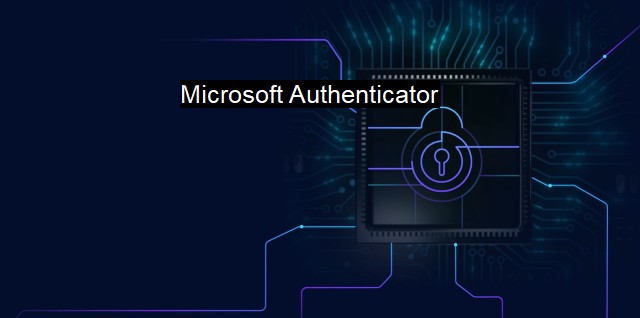What is Microsoft Authenticator?
Securing Our Data in the Digitized World: Understanding the Relevance of Microsoft Authenticator in Cybersecurity and Antivirus Measures
Microsoft Authenticator is an application developed by tech giant, Microsoft, aimed at enhancing cybersecurity by boosting the two-factor authentication process. In the threat-ridden digital landscape, everyone requires comprehensive security setups to stay safe. The basics in cybersecurity start with secure passwords, often reinforced by two-factor authentication or 2FA; this crucial security strategy was brought to another level by Microsoft Authenticator.In the cybersecurity arena, two-factor authentication (2FA) adds an extra layer of protection to the process of authentication. A typical user authentication process depends on something that an individual knows, typically the password or PIN. 2FA involves an essential additional factor: something an individual possesses. This could be your biometric, a physical token, or even your mobile device. That's where Microsoft Authenticator comes in handy, functioning as a smartphone application which prompts approval requests each time you try logging into your accounts, giving you an option to approve or deny those requests fundamentally.
Microsoft Authenticator makes use of the password-based authentication plus a push notification to your device or a verification code that's auto-generated by the app, enabling the two-factor authentication. It’s also intelligent enough to replace pesky passwords stored in browsers by using your mobile device’s biometric capabilities, hence decreasing exposure to password breaches.
The application has built-in security features that help to successfully ward off alarming cyber threats. It boasts a robust structure that can detect differences in honeypot traps and legitimate users through intricate algorithms, reducing the prospect of false alarms while simultaneously catching the real threats. This is a vivid indication of how the Authenticator is essentially an antivirus within itself, creating a protective sandbox around the critical data assets.
Microsoft Authenticator also offers additional layers of security besides 2FA. It offers multi-factor authentication (MFA) which could involve something an individual is such as a biometric detail – be it a fingerprint, face, or voice recognition. As more vectors of attack get unveiled as technology evolves, MFA offers a robust checkpoint even in the case of 2FA compromise.
Microsoft Authenticator works with standards such as FIDO2, which is widely recognized as a stronger security advancement compared to its first iteration. FIDO2 standard enables simplified stronger user authentication, strengthening the capacity to withstand cyber-attacks. This compatibility tends to give way to more sighs of relief in the IT departments while keeping ransomware threats at bay.
The fourth advantage of Microsoft Authenticator is that it helps safeguard against phishing attacks. Phishing attacks are notoriously difficult to detect, as cybercriminals attempt to mimic legitimate entities to fool individuals into divulging sensitive information. With Microsoft Authenticator, users no longer need to enter password credentials that can be captured or misused, hence eradicating phishing services’ attempts. The application increases resistance to such deceits by curtailing the manipulation of user inputs directly via peer-to-peer communication.
All scenarios considered, Microsoft Authenticator represents an innovative means to handle virtual threats. It presents a more intelligent approach to 2FA and MFA by leveraging a browser-intrinsic system and biometric capabilities on mobile devices. The effectiveness of such solutions like Microsoft Authenticator continuously proves pivotal in safekeeping user-friendly platforms, hedge off malware applications and inhibit the onset of malicious activities.
So, whether you're an individual looking for ways to beef up your personal cybersecurity or a large corporation focused on maintaining billion-dollar assets, you can depend on Microsoft Authenticator for an extra layer of defense. Undoubtedly, in an era dominated by sophisticated cyber threats and a mounting heat of high-stakes virtual espionage, Microsoft Authenticator finds itself right at the heart of the solutions that offer much-needed resilience against the ever complicated cybersecurity arena.

Microsoft Authenticator FAQs
What is Microsoft Authenticator?
Microsoft Authenticator is a free app that provides an additional layer of security to your online accounts. It allows you to authenticate your identity by providing a two-factor authentication system.How does Microsoft Authenticator work to enhance cybersecurity?
Microsoft Authenticator works as an additional layer of security by providing two-factor authentication. It requires you to enter a code generated by the app in addition to your password when you log in to your account. This ensures that only you can access your account and not any unauthorized person.Is Microsoft Authenticator efficient in protecting against viruses or malware?
Microsoft Authenticator is not designed to protect your device against viruses or malware. It is solely intended to enhance your account's security by reducing the risk of unauthorized access. You must use reliable antivirus software to protect your device from viruses and malware.Can I use Microsoft Authenticator with multiple accounts?
Yes, Microsoft Authenticator can be used with multiple accounts. You can add various types of accounts, including Microsoft accounts, Google accounts, Facebook accounts, and more. To add an account, you need to scan a QR code or manually enter your account credentials.| | A | | | B | | | C | | | D | | | E | | | F | | | G | | | H | | | I | | | J | | | K | | | L | | | M | |
| | N | | | O | | | P | | | Q | | | R | | | S | | | T | | | U | | | V | | | W | | | X | | | Y | | | Z | |
| | 1 | | | 2 | | | 3 | | | 4 | | | 7 | | | 8 | | |||||||